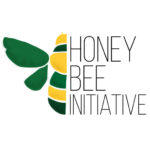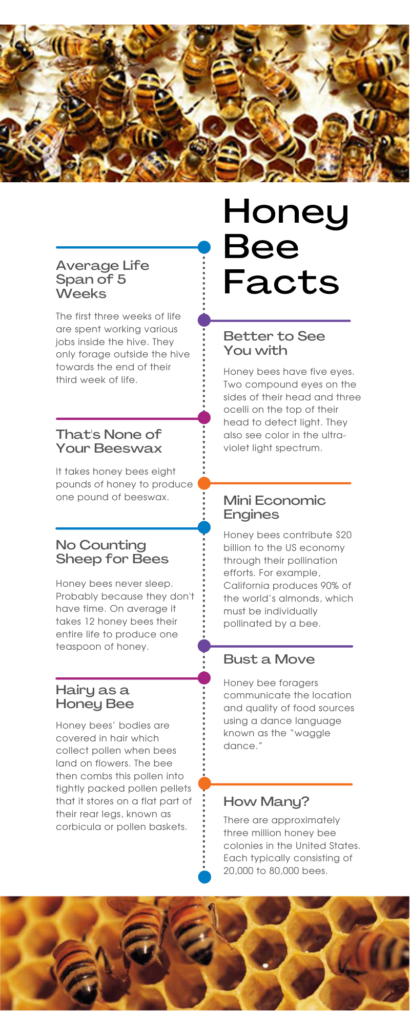 Why is the work of the Honey Bee Initiative important?
Why is the work of the Honey Bee Initiative important?
Honey bees are threatened and bee health is critical to human survival. If bees don’t thrive, neither do we.
The health of pollinators is directly linked to food security. Of the 100 crop varieties that provide 90 percent of the world’s food, 71 are pollinated by bees. In North America, honey bees alone pollinate nearly 95 kinds of fruits, such as almonds, avocados, cranberries and apples, in addition to commodity crops like soy. Pollination services are a core component of global agricultural production, valued at over $125 billion annually. In the U.S. alone, the value of pollination services is estimated to be $20-30 billion annually.
As the photos below demonstrate, our grocery store produce sections look abundant with bees, without them, they are decimated. And believe it or not, pollination affects dairy choices as well. Of the many crops pollinated by bees, clover and alfalfa, included, are the foods our milk-producing animals eat. Without bees, we are facing more than a 50 percent reduction in milk products!

But just as importantly, HBI provides us with a model for how institutions of higher education can address global goals through multidisciplinary and innovative teaching and research, and meaningful partnerships across sectors.
What is the Honey Bee Initiative’s purpose?
We seek to:
- Educate students and the community about the interdependence of pollinators and human food sources and modeling best-practice methods in the management of honeybee hives
- Advance global sustainability initiatives and economic alternatives for underserved regions
- Collaborate with public and private groups on honey bee sustainability
Is it dangerous to have bees on campus?
No. Since they are vegetarians, honeybees are not aggressive by nature and only seek pollen and nectar sources. Honeybees only sting when protecting their hive or themselves from a threat. Occasionally, observers may encounter a swarm of bees looking for a new hive. These bees will gather on a tree limb or concealed space until scouts find a new home, usually within 12 to 36 hours. During swarming, the bees have nothing to defend, so they are unusually calm and not prone to sting.
What does you do with your honey? Can I purchase it?
Yes! Most honey is left in the hives to support the bees through the winter. During late summer, excess honey is harvested and distributed to supporters when they make philanthropic gifts. In addition, honey and beeswax candles can be purchased to support HBI.
Can I visit Mason’s honeybees?
Generally, visits to the bees are reserved for Mason students currently enrolled in beekeeping classes. We do, however, offer educational tours for small community groups. If you would like more information, please email [email protected].
I am a Mason student. Can I take a beekeeping class?
Yes. Beekeeping courses are offered through the College of Science’s Department of Environmental Science and Policy each semester.
I am not a Mason student. Can I take a beekeeping class?
At this time, we do not offer any beekeeping courses for the general public. We would encourage interested parties to contact their local beekeeping association. For Fairfax County, the Northern Virginia Beekeepers Association (NVBA) can provide information on how to get involved with beekeeping. In Manassas and points west, contact the Prince William Regional Beekeepers Association.
What’s next for the Honey Bee Initiative?
We have big dreams and would like to scale existing programs in Colombia and Perú and establish an even broader global network of programs. We’d also like to introduce new programs. One project on the horizon includes AR/VR technology using bees as a vehicle to get students interested in STEM careers, entrepreneurship, and innovation. We recognize that the quality of the world future generations will inherit depends on the active participation of young people as scientists and citizens in how we manage our natural resources. And we’re continually seeking out new partnerships to promote sustainable beekeeping and food security. Visit our partners page if you’d like to get involved.
